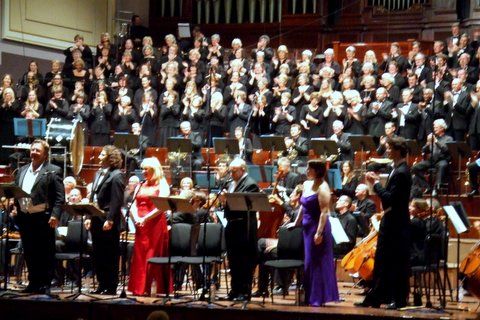|
|
|
|
|
|
|
|
| The Spectator, 16 September
2006 |
| by Michael Tanner |
Wagner: Die Meistersinger von Nürnberg, Edinburgh, 2 September 2006
|
Special affair
|
|
 Brian McMaster’s 15-year period directing the
Edinburgh International Festival came to an entirely appropriate end with a
concert performance in the Usher Hall of Wagner’s great comedy Die
Meistersinger von Nürnberg, with a starry cast, the Festival Chorus and the
BBC Scottish Symphony Orchestra, much enlarged for the occasion, under the
baton of David Robertson. It was a thrilling affair, and it was greeted with
even greater enthusiasm, bordering on wildness, than that for Die
Zauberflöte two evenings previously. Either the audience is getting more
unbuttoned — surprising considering the extreme seniority of at least a
large proportion of it — or these two performances were really something
very special. Brian McMaster’s 15-year period directing the
Edinburgh International Festival came to an entirely appropriate end with a
concert performance in the Usher Hall of Wagner’s great comedy Die
Meistersinger von Nürnberg, with a starry cast, the Festival Chorus and the
BBC Scottish Symphony Orchestra, much enlarged for the occasion, under the
baton of David Robertson. It was a thrilling affair, and it was greeted with
even greater enthusiasm, bordering on wildness, than that for Die
Zauberflöte two evenings previously. Either the audience is getting more
unbuttoned — surprising considering the extreme seniority of at least a
large proportion of it — or these two performances were really something
very special.
Meistersinger was special in several ways, though it was not a profound or a
great interpretation. It is an opera that we very rarely get a chance to see
these days, presumably because it demands such a large number of fine
soloists, and because the forces involved are so immense. Yet I have the
feeling that it is also under a cloud, regarded, thanks to Sachs’s closing
paean to ‘holy German art’, as a suspicious work. A considerable number of
soi-disant Wagner specialists spend much of their energy demonstrating its
contribution to the prehistory of Nazism, with special attention to the
alleged anti-Semitism in the portrayal of Beckmesser, and its supposed
contribution to a dangerously nationalistic fervour in the crucial period of
the late 1860s and early 1870s, when German unity was at last being
achieved.
One of the blessings of a concert performance, with only a minimum of
gesturing, is that these considerations, entirely bogus as they are in my
opinion, cannot be raised in its presentation, however much programme notes
may incite us to think along those lines. There are respects in which this
is the most visual of all Wagner’s later dramas, with a complicated action
and a great deal of by-play. Certainly the humour of some scenes is largely
lost without action, but that may be compensated for by the greater
attention the singers can devote to what is a taxing score, though it is
only Sachs who has an enormous role to sing, comparable to the major roles
in the other dramas.
It is, for anyone with the stamina to carry it through to its exultant
conclusion, the role of roles, and Robert Holl, who has sung it many times
at Bayreuth, clearly relished the chance not to have to act it — not that he
ever does, much. Sachs gives voice to sentiments that are darker than those
of any other character in Wagner’s oeuvre, regarding the world as governed
ineluctably by folly, so that it is only the man who sees the illusoriness
of all endeavour who can direct things to ensure that the apparent successes
of others, their hopes and happiness, can be sustained for a bit longer than
they otherwise would be — that is the most that anyone can achieve. However,
the music to which he voices these and other equally depressing sentiments
has such radiance that it is easy to overlook the depth of this work’s
pessimism, and Holl colluded with the conductor to make sure that that’s
just what we would do. Robertson conducted with brassy cheeriness
throughout, aided by the comparative scrawniness of the strings, especially
the higher ones, though there appeared to be plenty of them.
Holl’s two-dimensionality shifted some emphasis on to the other roles: that
was above all the case with the gloriously resonant and intelligent Pogner
of Matthew Rose, a great bass in the making; and spectacularly with the
Walther of Jonas Kaufmann, who brought such deep understanding to his first
performance of this role that for once Walther became the cynosure he should
be: he built the Prize Song with surpassing skill, truly as a remembered
dream. Andrew Shore was a brilliantly subtle, firm-voiced Beckmesser,
and the lesser masters were played by singers from, in some cases, the
distant past. And Toby Spence was an ideal David, fussy and mellifluous.
Only the Eva of Hillevi Martinpelto was a disappointment — but every
Meistersinger has one. |
|
|
|
|
|
|
|
|
|
|
|
|
|
|
|
|
|
|